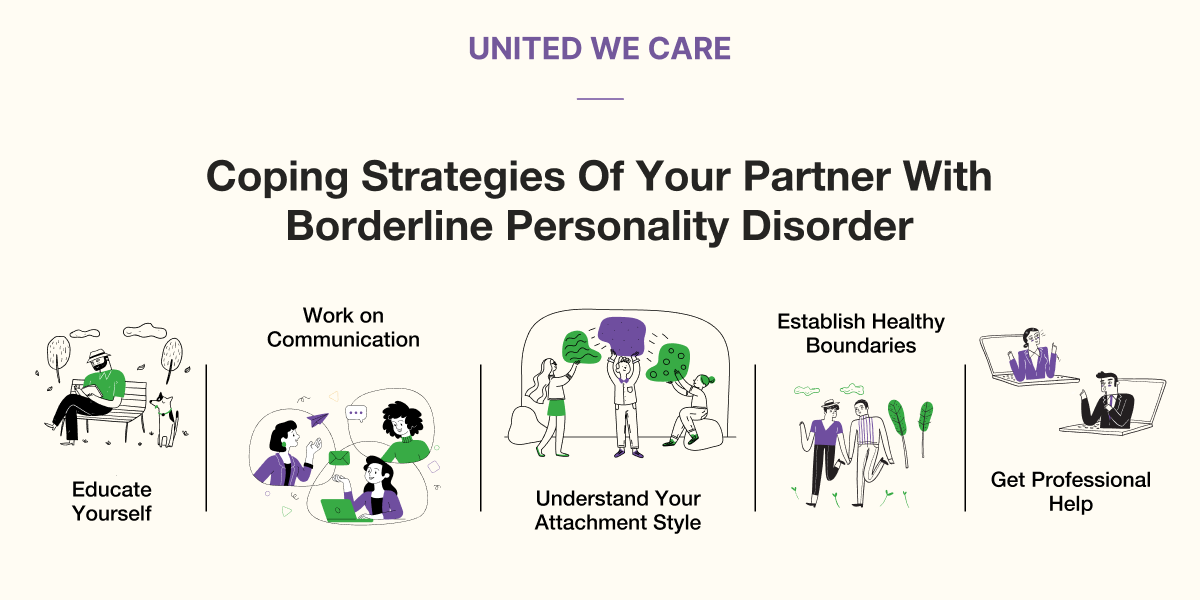Introduction
Relationships are hard enough, let alone when your partner has borderline personality disorder. There is a lot of stigma giving people a bad name for having this mental health condition. One must remember that people should not be labeled by their problems.
Yes, borderline personality disorder may have a strong impact on a person’s life, especially their romantic relationship. Nevertheless, it is possible to cope with this issue, and you and your partner could lead a healthy and meaningful romantic life together.
How Do You Know If Your Partner Has Borderline Personality Disorder?
Firstly, let’s figure out how to know if your partner really does have borderline personality disorder. Essentially, this is best done in a therapist’s office with a licensed professional. Nonetheless, if you see the following signs in your partner, they could be living with borderline personality disorder.
Chronic Feelings of Emptiness
Does your partner ever seem like they’re struggling to find a purpose or the meaning of life? Do they complain of or seem to be suffering from feelings of emptiness? It is a common symptom of borderline personality disorder to feel disconnected from the self, from others, from life, or the world at large.
This is also related to the symptom of having a distorted sense of self. Typically, people with borderline personality disorder have a tough time understanding spirituality or feeling connection for prolonged periods.
High Impulsivity
Simultaneously, someone with BPD may indulge in sensation-seeking in an attempt to find a connection or avoid the feeling of emptiness. Generally, borderline personality disorder is associated with high impulsivity.
Examples of impulsivity include reckless spending, unsafe sex, addictions, or other ways of living life on the edge. Sadly, BPD hampers a person’s ability to think or care about consequences in the moment of impulsivity. Frequently, it is the partner who must bear the brunt of this behavior.
Emotional Instability
Another sign that your partner may have borderline personality disorder is if you see them having frequent and intense mood swings. In one hour, they may, at times, experience a wide range of feelings and emotions.
Usually, this also includes how they feel about someone or something. Maybe initially, they are pedestalizing the object of affection. Soon enough, however, they think very poorly of the same thing because they got offended.
Distorted Way of Thinking
People with borderline personality disorder tend to think in unhelpful ways, which leads to more emotional suffering. For instance, they may see the world in black or white, always thinking in binaries.
Perhaps they have an all-or-nothing type of thinking, where everything either needs to be in their favor or is worthless. These are just a few examples of the cognitive distortions that are common in BPD.
Volatile Interpersonal Relationships
Another sign that your partner might have borderline personality disorder is if they have a history of volatile relationships. Here, we mean not just romantic relationships but other kinds, too, such as in the workplace or within the family.
If you find a relatively consistent pattern of interpersonal conflicts, blaming behavior, and an inability to resolve things, your partner could have BPD.
Impact on The Relationship If Your Partner Has Borderline Personality Disorder
Naturally, all these factors will have an impact on your relationship with your partner. In this section, we’ll describe some of the unpleasant experiences you might face, either caused or worsened by your partner’s borderline personality disorder.
Frequent Conflicts
If your partner has a borderline personality disorder, it is common to have frequent and recurring fights. You may even notice a pattern of conflicts indicating what your partner’s triggers could be.
Maybe there are some themes that keep showing up in your fights that are generated from your partner’s deep insecurities. Having borderline personality disorder makes it hard for them to resolve these issues, and they tend to blow up in fights with you.
Trust Issues
One common source of conflict could be trust issues that build up from both ends. Your partner’s fear of abandonment may make it difficult for them to trust that you love them and will not desert them.
Similarly, their impulsive and risky behavior may make it hard for you to trust their loyalty and faithfulness. There could even be incidents of infidelity that shake up the foundation of your relationship.
Unhealthy Boundaries
It is crucial to understand that anyone with borderline personality disorder is likely to have attachment trauma and a history of some form of neglect. Consequently, they do not develop the skill of establishing and respecting healthy boundaries needed to sustain a relationship.
You might find your partner violating your boundaries, not having any of their own, or being too cold/rigid to keep people out.
Violence and Outbursts
Most people with borderline personality disorder are also struggling with unresolved trauma that dysregulates their nervous system. Each time they are triggered, their body may activate the fight, flight, freeze, or fawn response.
This can be extremely difficult to navigate, especially if they have been exposed to a lot of aggression in the past. You might experience inappropriate outbursts and various kinds of violence in conflicts with your partner.
Risky Behavior
Whatever your partner does is bound to impact you when you are in a committed relationship, especially if you’re married. So, if your partner has high impulsivity, their dangerous choices and risky behavior may lead to significant problems and distress for you.
People with BPD tend to indulge in self-sabotage, self-harm, and even suicide attempts. Often, they show very little regard for self-preservation and safety.
How to Cope When Your Partner Has Borderline Personality Disorder
Fortunately, there are things you can do to preserve your relationship, even if your partner has borderline personality disorder. The following are a few ways you can cope with this issue.

Educate Yourself
The most important thing you can do to help in this situation is to educate yourself about borderline personality disorder. A few more psychological topics that could be useful for you are attachment styles, trauma-informed care, and somatic therapy.
Work on Communication
They say communication is key in any relationship, and even more so if your partner has borderline personality disorder. Both of you need to learn how to communicate your needs, desires, requests, fears, and concerns. More importantly, you need to learn how to listen to each other so you both feel heard and validated.
Understand Your Attachment Style
Once you learn about attachment styles, it’s a good idea to find out what your individual styles are. You might even discover that you have an insecure style of attachment, which enables some of the toxic patterns in your relationship. Understand them and find ways to become more securely attached.
Establish Healthy Boundaries
No relationship can survive for a long time without both partners establishing healthy boundaries. Boundaries may seem like things that create distance, but they actually exist to preserve the relationship instead of breaking it off forever. Work with your therapists to learn how to build and respect boundaries.
Get Professional Help
It is highly recommended that you seek professional help throughout this process. There are different kinds of services you could seek, but make sure they are all trauma-informed. You can opt for individual therapy, couple’s therapy, family therapy, somatic therapy, and group therapy.
Conclusion
It can be quite tedious and exhausting when you’re in a relationship with a partner who has borderline personality disorder. The impact of this mental health condition not only affects them but your relationship with them too.
Thankfully, it is possible to overcome these challenges with the help of professional mental health services. At United We Care, you can find solutions to all your concerns and learn how to cope with a partner who has borderline personality disorder.
References
[1] Bouchard, S., Sabourin, S., Lussier, Y. and Villeneuve, E., 2009. Relationship quality and stability in couples when one partner has borderline personality disorder. Journal of marital and family therapy, 35(4), pp.446-455.
[2] Greer, H. and Cohen, J.N., 2018. Partners of individuals with borderline personality disorder: A systematic review of the literature examining their experiences and the supports available to them. Harvard Review of Psychiatry, 26(4), pp.185-200.
[3] Lavner, J.A., Lamkin, J. and Miller, J.D., 2015. Borderline personality disorder symptoms and newlyweds’ observed communication, partner characteristics, and longitudinal marital outcomes. Journal of abnormal psychology, 124(4), p.975.





